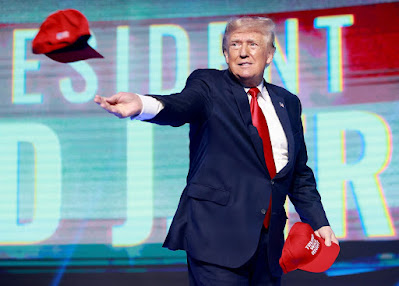The relationship between President Donald Trump and white supremacists has been a topic of considerable controversy and debate. During his tenure as the 45th President of the United States, Trump's rhetoric and actions often sparked discussions about his association with white supremacist groups and the extent to which he may have emboldened them. This blog aims to explore the complexities of this relationship, considering key incidents and statements that shed light on the matter.
To understand Trump's connection to white supremacists, we must first examine his rise to political prominence. During the 2016 presidential campaign, Trump's appeal was rooted in populism, voicing concerns shared by a portion of the American population regarding immigration, trade deals, and economic opportunities. However, some critics argue that elements of his rhetoric, such as the infamous "Muslim ban" proposal and his emphasis on border security, inadvertently resonated with certain white supremacist groups who held xenophobic and racially biased views.
Throughout his presidency, President Trump made several controversial statements that sparked accusations of catering to white supremacist sentiments. Notably, after the violent white supremacist rally in Charlottesville, Virginia, in August 2017, Trump's response was heavily criticized for initially failing to directly condemn the hate groups involved. While he later condemned racism and bigotry, his equivocation raised concerns about his stance on white supremacism.
Additionally, Trump's retweeting of messages from white nationalist Twitter accounts and failure to disavow prominent white supremacists who expressed support for him further fueled suspicion regarding his association with such ideologies. Critics contended that his reluctance to distance himself from these individuals or groups implicitly validated their beliefs.
It is crucial to acknowledge that not all of Trump's supporters endorsed white supremacist ideologies. Many were drawn to his anti-establishment rhetoric, promises of economic growth, and perceived defense of traditional American values. Unfortunately, the actions of a minority within any political movement can wrongly taint the entire group's reputation. Trump himself has denied any association with white supremacists and denounced racism on multiple occasions.
Analyzing Trump's policies reveals a mix of positions that complicate his relationship with white supremacists further. For example, the administration implemented criminal justice reforms, including the First Step Act, which aimed to address racial disparities in the prison system. Conversely, the strict immigration policies and the divisive rhetoric surrounding them led some to argue that they disproportionately targeted communities of color, fostering an environment of racial tension.
The relationship between President Donald Trump and white supremacists is a complex and contentious subject. While some of Trump's rhetoric and actions raised concerns among critics about his association with white supremacist ideologies, others maintained that his appeal lay in economic and populist sentiments rather than explicit support for such groups.
To form a comprehensive understanding of this relationship, it is crucial to evaluate Trump's entire tenure, considering both positive and negative actions, while avoiding hasty generalizations or sensationalism. As time passes and new information emerges, historians and scholars will continue to examine this issue, seeking a nuanced and objective interpretation of the relationship between President Trump and white supremacists.
Related Posts:
1. TRUMP'S RELATIONSHIP WITH THE BUSH FAMILY: A COMPLEX POLITICAL SAGA
4. ARE TRUMP TAX CUTS GOOD FOR UNITED STATES OF AMERICA? WILL THE TAX INTAKE INCREASE?
5. IS DONALD TRUMP A NAZI? HATE AGAINST MUSLIMS & MEXICANS REACHES NEW LEVELS
Other Related Posts:
3. PEOPLE ARE SAYING: TRUMP LIKES PEE | FULL FRONTAL WITH SAMANTHA BEE
4. THE REPUBLICANS ARE GOING TO FOLD
5. OBAMA’S TRUMP CARD ON THE DEBT LIMIT




